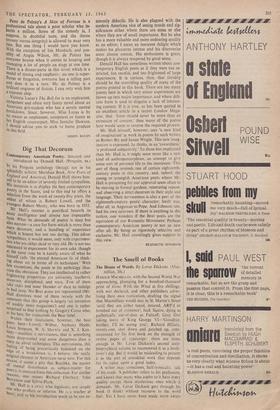Dig That Decorum
Contemporary American Poetry. Selected and introduced by Donald Hall. (Penguin. 6s.) IN his Penguin anthology (though not in his splendidly eclectic Meridian Book, New Poets of England and America), Donald Hall shows him- self to be an editor of severely limited sympathies. His intention into display the best contemporary Poetry in the States, and to this end he offers a selection from the work of twenty-five poets, the oldest of whom is Robert Lowell, and the Youngest Robert Mezey, who was born in 1935. Mr. Hall's manner is pontifical beneath its acute intelligence and almost too impeccable taste. What he demands of poetry is deep but also narrow—a care for form which is more than- mere decorum, and a handling or experience which is honest but not too daring. This editor sympathises, it would seem, only with experimen- ters who are either dead or very old. He is not too interested in experiment for its own sake, though at the same time he is keenly aware of what he himself calls 'the eternal American tic of think- ing about art in terms of- its techniques.' With few exceptions, the poets in his anthology illus- trate this obsession. They are intellectual (a rather frightening proportion are university teachers), decorous, disciplined, and wary. Few of them take risks and none blunder or dare to indulge in bad taste. No Beat poets are represented (Mr. Hall dismisses most of them tersely with the comment that this group is largely 'an invention of weekly news magazines') and one is rather surprised to find nothing by Gregory Corso who, at his best, far transcends the Beat label. Within their limitations, however, the best Poets here—Lowell, Wilbur, Anthony Hecht, Louis Simpson, W. S. Merwin and X. J. Ken- nedy—.manifest a nervousness that is something more deep-rooted and more dangerous than a mere tic about techniques. This nervousness, this feeling of being precariously balanced- on the edge of a breakdown is. I believe, the really original element in American verse 'now. For this reason, it seems a pity that Roethke, the master of mental disturbance as subject-matter for Poetry, is omitted from this collection.- For similar _reasons; one- misses Richard Eberhart, John Berryman and Sylvia Plath. Mr. Hall is a critic who legislates. not simply .0neean who proffers or informs. He is a teacher at /l, and so his introduction tends to be too in sistently didactic. He is also plagued with the modern American vice of seeing trends and sig- nificances either where there are none or else where they are of small importance. But he also has a more valuable and more endearing quality as an editor; I mean an innocent delight which makes his pleasures intense and his discoveries seem almost cosmic. His enthusiasm is great, .though it is always tempered by good sense.
Donald Hall has sometimes written about con- temporary English poets as if they were too re- stricted, too careful, and too frightened of large experiences. It is curious, then, that timidity should be the overriding quality of many of the poems printed in this book. There are too many poems here in which very minor experiences are blown up into major importance, and where deli- cate form is used to disguise a lack of interest- ing content. If it is true, as has been quoted in an excellent article in a recent London Maga- zine, that 'form should never be more than an extension of content,' then many of the poems here would seem to reverse the required process.
Mr. Hall himself, however, sees 'a new kind of imagination' at work in poems by such writers as Robert Bly and James Wright. This new imag- ination is expressed, he thinks, in an 'inwardness,' 'a profound subjectivity.' To those less implicated than Mr. Hall is, it might seem more like a new kind of anthropomorphism, an attempt to give some sort of personal life to the inanimate. This sort of thing reminds one of certain eighteenth- century poets in this country, and, indeed, the young or youngish American poets whom Mr. Hall is presenting for our approval seem often to be moving in-formal gardens, venerating reason. and observing a strict decorum in their style and language. Their nervousness is also a part of the eighteenth-century poetic character; Swift was. after all, as Augustan as Pope. And Johnson. too. had his own neuroses. If there is anything in this notion, one wonders if the Beat poets are the equivalent of our Romantic Movement: Perhaps contemporary: American poetry is—not so new after all. By being so rigorously selective and exclusive, Mr. Hall unwittingly gives support to this view.
ELIZABETH 'JENNINGS


































 Previous page
Previous page